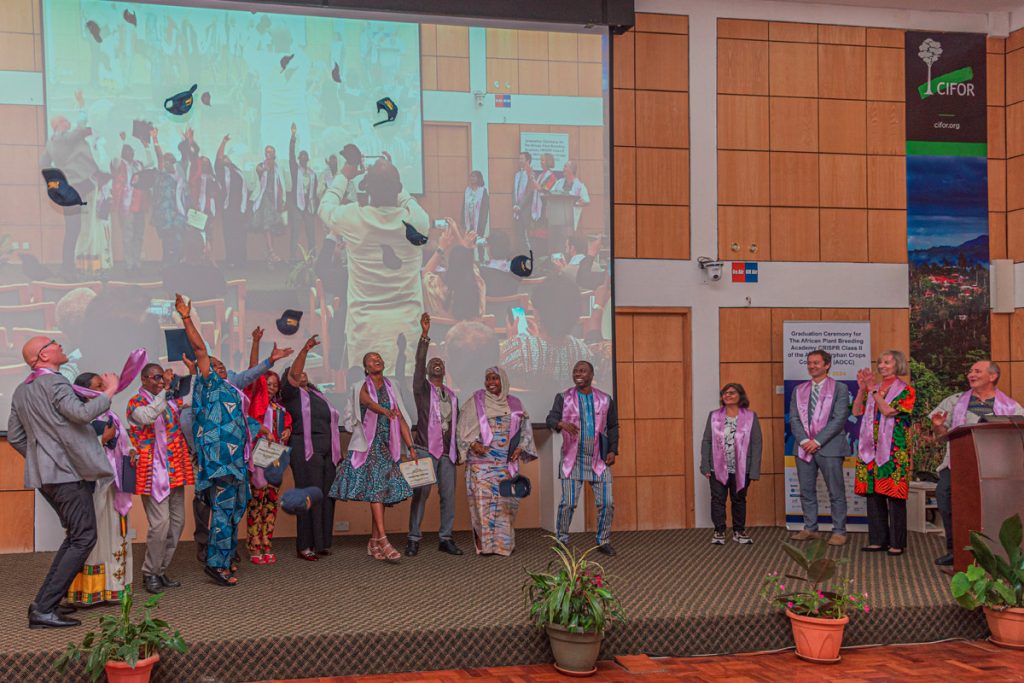
Second CRISPR cohort completes course at the African Plant Breeding Academy
Nairobi, Kenya (25 October 2024) — Eleven molecular scientists from across the African continent graduated from the African Plant Breeders’ Academy (AfPBA) CRISPR genome editing course on Friday, 11 October, at the Nairobi headquarters of the Center for International Forestry Research and World Agroforestry (CIFOR-ICRAF).
The scientists, who hail variously from Kenya, Ghana, Nigeria, Ethiopia, Malawi, Burkina Faso, South Africa, and Mozambique, represented the second cohort to undertake the course, which is led by the University of California, Davis as part of the African Orphan Crops Consortium (AOCC) in collaboration with the International Institute for Tropical Agriculture (IITA) and the Innovative Genomics Institute (IGI) at UC Berkeley, with support from the African Union (AU).
The program is hosted in Nairobi by CIFOR-ICRAF and the International Livestock Research Institute (ILRI), and this cohort was funded by Grantham Foundation, Syngenta, and US-based FFAR (Foundation for Food and Agriculture Research).
“Our shared vision is to bring cutting-edge technologies to brilliant African scientists so they can quickly develop priorities adapted to the changing climate,” said Éliane Ubalijoro, CIFOR-ICRAF’s CEO. “This unique programme focuses on genome editing from design to validation, leveraging DNA sequencing information from 101 African orphan crops. The goal is to build a food- and nutrition-secure future for Africa.”
“It is very important for governments to take ownership,” said Olalekan Akinbo, Head of the Centre of Excellence in Science, Technology and Innovation (CoE-STI) under the African Union Development Agency (AUDA)-NEPAD. “The innovation you are driving in today is innovation for your country and for Africa, and fits well with the cardinal goal of [the AU’s] Agenda 2063 – that there will be zero hunger on the continent.”
“Africa shall rise – and agriculture is the solution,” said Enoch Achigan-Dako, a 2016 graduate of the AfPBA plant breeding course, and vice-chair of the African Plant Breeders Association. “It is critical that I remind each of us here today of the urgent need to unlock Africa’s potential – for its countries, for the youth, for women, for the continent as a whole.”
Emily Gichuhi, a research scientist at the Kenya Agricultural and Livestock Research Organization (KALRO), spoke on behalf of the graduating cohort. “The intensity and quality of this training allowed each one of us to identify a real challenge to tackle back home using the skills acquired on this journey, showing that if the right tools are in our hands, we are able to make impactful changes towards food and nutritional security in Africa,” she said.
Rita Mumm, the director of AfPBA, and director of capacity development and mobilisation at AOCC, closed the graduation ceremony. She tasked the graduates with their next mission of establishing a gene editing programme at their own national research institutes, and encouraged them to continue collaborating within the AfPBA and AOCC’s expanding network of crop improvement scientists.
“Success will be sweet – and it will be nutritious,” she concluded. “You can eliminate hunger and malnutrition in your lifetime.”
For further information, please contact Sarah Ooko (s.ooko@cifor-icraf.org).













